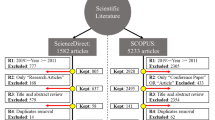Abstract
Small and Medium-sized Enterprises (SMEs) are facing everyday the hard competition of global markets and higher requirements of the customers. For coping with these changing conditions many large enterprises implement a Lean Production System (LPS). An LPS offers a holistic strategy to eliminate waste in processes, to achieve high product and process quality, and to reduce lead times. The structure of an LPS is described by hierarchical connections of different elements and is configured in four levels: the goals, the sub-goals, the methods, and tools (Dombrowski et al. ZWF Zeitschrift für wirtschaftlichen Fabrikbetrieb 101:113–118, 2006). While large enterprises are able to provide necessary resources and experts’ know-how to configure and implement an LPS, SMEs lack these essential resources for organizational, technological, and workforce-related changes. Due to the complexity of the structure of an LPS, SMEs have in practice a small opportunity to configure a suitable structure and often fail in selecting and evaluating the most adequate methods and tools to be used. In this regard, the paper presents a framework to support an adaptive configuration of an LPS in SMEs which has been partly developed in the research project ProfiL in close cooperation with six SMEs.





Similar content being viewed by others
References
Ohno T (1998) Toyota production system: beyond large scale production. Productivity Press, Portland, OR
Spath D (2003) Ganzheitlich produzieren: Innovative Organisation und Führung. Log_X, Stuttgart
Womack J-P, Jones D-T (2003) Lean thinking: banish waste and create wealth in your corporation. Simon & Schuster, New York
Cochran D-S (1999) The production system design and deployment framework. In: Proceedings of the SAE international automotive manufacturing conference, SAE Technical Papers: 1–9, Detroit
Korge A (2005) Lean management mit system. wt Werkstattstechnik online 95:29–34
Dombrowski U, Palluck M, Schmidt S (2006) Strukturelle Analyse Ganzheitlicher Produktionssysteme. ZWF Zeitschrift für wirtschaftlichen Fabrikbetrieb 101:113–118
Liker J-K, Meier D (2006) The Toyota way fieldbook: a practical guide for implementing, Toyota’s 4Ps. McGraw-Hill, New York
Spear S, Bowen H-K (1999) Decoding the DNA of the Toyota production system. Harv Bus Rev September–October: 97–106
Dombrowski U, Schmidt S, Crespo I (2007) Knowledge management as a supporting function in lean production system implementation. In: Proceedings of the 2nd international conference on changeable, agile, reconfigurable and virtual production, 453–462, Toronto
Dombrowski U, Crespo I, Schmidt S (2007) A holistic approach to production optimization as an integral part of strategy development and implementation in small-and medium-sized enterprises. In: Proceedings of the 40th CIRP international manufacturing systems seminar, Liverpool
Dombrowski U, Quack S (2007) Erfolgreiche Restrukturierungsprojekte durch Mit-arbeiterpartizipation. ZWF Zeitschrift für wirtschaftlichen Fabrikbetrieb 102:568–571
Welter F (2003) Strategien, KMU und Umfeld. Duncker & Humblot, Berlin
Schneider H (2000) Produktionsmanagement in kleinen und mittleren Unternehmen. Schäffer-Poeschel, Stuttgart
Herrmann C, Bergmann L, Crespo I (2006) Developing of an integrated modernization concept for SMEs. In: Proceedings of the 39th CIRP international seminar on manufacturing systems, 457–463, Ljubljana
Kuhn S, Elzenheimer J (2006) Gezielter Methodeneinsatz im Mittelstand. VDI-Zeitschrift 6:86–89
Dombrowski U, Crespo I (2008) Strategy-oriented qualification framework as a supporting function of lean production system implementation in small and medium-sized enterprises. In: Mitsuishi M, Ueda K, Kimura F (eds) Manufacturing systems and technologies for the new frontier. Springer, London, pp 77–82
Lay G, Zanker C (2008) Planungsinstrumente zur Verwirklichung Ganzheitlicher Produktionssysteme in KMU. wt Werkstattstechnik online 98:242–248
Dombrowski U, Horatzek S, Zeisig M (2002) Situatives mitarbeiterbezogenes management der ressource Wissen. wt Werkstatt Technik online 92/6:312–316
Dombrowski U, Crespo I (2009) Qualifizierungskonzept zur integrierten Modernisierung. In: Dombrowski U, Hermann C (eds) Modernisierung kleiner und mittlerer Unternehmen. Springer, Berlin, Heidelberg New York, pp 109–116
Dombrowski U, Tiedemann H, Bothe T (2003) Further education and training employees as a strategic competitive factor. BFT Betonwerk und Fertigteil-Technik 4:6–14
Dombrowski U, Crespo I (2008) A management approach to lean production system implementation in small and medium-sized enterprises—results of a research project. In: del Olmo R, Martínez J-M, Galán Ordax J-J, Villahoz Laviós (eds) Approaches and trends on current organization engineering. Servicio de publicaciones de la Universidad de Burgos, Spain, pp 995–1005
Author information
Authors and Affiliations
Corresponding author
Rights and permissions
About this article
Cite this article
Dombrowski, U., Crespo, I. & Zahn, T. Adaptive Configuration of a Lean Production System in Small and Medium-sized Enterprises. Prod. Eng. Res. Devel. 4, 341–348 (2010). https://doi.org/10.1007/s11740-010-0250-5
Received:
Accepted:
Published:
Issue Date:
DOI: https://doi.org/10.1007/s11740-010-0250-5




